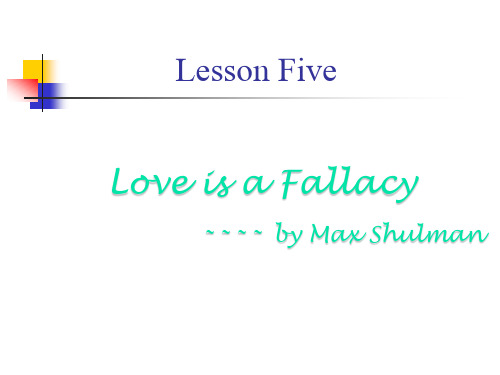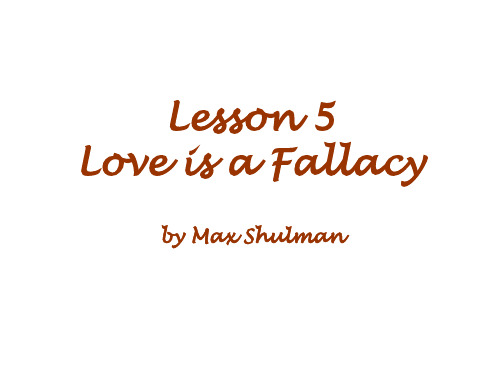Unit_5_Love_is_a_Fallacy爱是谬论 高英
- 格式:ppt
- 大小:334.00 KB
- 文档页数:17

![[VIP专享]高级英语第二册第五单元love is a fallacy课文翻译19](https://img.taocdn.com/s1/m/78c52a9f33d4b14e8524689e.png)
第五单元课文翻译爱情就是谬误马克斯·舒尔曼1).查尔斯·兰姆是一个世所罕见的性情欢快、富有进取心的人,他那笔下的散文《古瓷器》和《梦中的孩子)无拘无束、自由奔放,实在令人难忘。
下面这篇文章比兰姆的作品更加自由奔放。
实际上,用“自由奔放”的字眼来形容这篇文章并不十分确切,或许用“柔软”、“轻松”或“轻软而富有弹性”更为恰如其分。
2).尽管很难说清这篇文章是属于哪一类,但可以肯定它是一篇散文小品文。
它提出了论点,引用了许多例证,并得出了结论。
卡莱尔能写得更好吗? 罗斯金呢?3).这篇文章意在论证逻辑学非但不枯燥乏味,而且活泼、清新、富于美感和激情,并给人以启迪。
诸位不妨一读o——作者注1.我这个人头脑冷静,逻辑思维能力强。
敏锐、慎重、聪慧、深刻、机智——这些就是我的特点。
我的大脑像发电机一样发达,像化学家的天平一样精确,像手术刀一样锋利。
——你知道吗?我才十八岁呀。
2.年纪这么轻而智力又如此非凡的人并不常有。
就拿在明尼苏达大学跟我同住一个房间的皮蒂·伯奇来说吧,他跟我年龄相仿,经历一样,可他笨得像头驴。
小伙子长得年轻漂亮,可惜脑子里却空空如也。
他易于激动,情绪反复无常,容易受别人的影响。
最糟的是他爱赶时髦。
我认为,赶时髦就是最缺乏理智的表现。
见到一种新鲜的东西就跟着学,以为别人都在那么干,自己也就卷进去傻干——这在我看来,简直愚蠢至极,但皮蒂却不以为然。
3.一天下午,我看见皮蒂躺在床上,脸上显露出一种痛苦不堪的表情,我立刻断定他是得了阑尾炎。
“别动,”我说,“别吃泻药,我就请医生来。
”4.“浣熊,”他咕哝着说。
5.“浣熊?”我停下来问道。
6.“我要一件浣熊皮大衣,”他痛苦地哭叫着。
7.我明白了,他不是身体不舒服,而是精神上不太正常。
“你为什么要浣熊皮大衣?”8.“我本早该知道,”他哭叫着,用拳头捶打着太阳穴,“我早该知道查尔斯登舞再度流行时,浣熊皮大衣也会时兴起来的。
我真傻,钱都买了课本,可现在不能买浣熊皮大衣了。


![Lesson 5 Love is a Fallacy[1]](https://img.taocdn.com/s1/m/1262210ab52acfc789ebc9b5.png)

Unit 5Love Is a FallacyMax ShulmanTeaching TipsThe most important take-home lesson of this essay is Shulman‟s mock-serious tone. Shulman pokes fun at the pomposity of his character, Dobie Gillis, a law school freshman, but what Shulman really gets at is the conceitedness of self-styled “learned” people. He shows that what they think they know can backfire, leaving them with nothing but awkwardness. The second lesson is how Shulman achieves his humor. Call students‟ attention to the contrast between the language used by Gillis and Espy, for example, Gill is‟s pedantic tone and Espy‟s relaxed colloquialisms. Shulman is also an excellent storyteller, so spend some time discussing with your students how Shulman brings his characters alive, how he keeps the pace of the story fast by using ellipses, inversions, short sentences, etc., and how the essay ends on a high note with climax and anti-climax.Before the week starts, ask your students to think about what the title could possible mean, and what they can predict about the essay just from the title. It is also a good idea to ask them to attribute a few adjectives to each character after their first reading (skimming) of the text, and then to add supporting evidence from their second close reading of it. In addition, during the preview stage, you can ask your students to list the logical fallacies that Gillis and Espy discuss in their meetings together. If time permits/Time permitting, students can put on a play in class to recreate the essay, using their preview notes as a guide. Before the weekends, leave time to ask the students to think about the essay as a whole and discuss the take-home lessons. Enjoy!Structure of the TextI. Section One: The author mocks at his own essay and introduces his subject matter. Hecreates suspense by telling the readers that the essay will demonstrate that other side of logic.(Paras. 1-3)II. Section Two: The beginning part of the story establishes the characters and setting and introduces the conflict.1. The narrator Dobie Gillis, a college freshman, introduces himself and his roommate PeteyBurch. Burch yearns for a raccoon coat, which happens to be in fashion on campus, and is willing to give anything for it. (Paras. 4-40)2. Gillis finds a raccoon coat and persuades Burch to let go his girlfriend Polly Espy inreturn for the coat. (Paras. 41-59)III. Section Three: Gillis endeavors to turn Espy into a worthy lawyer‟s wife.1. Gillis has his first date with Espy and tries to teach her a few logical fallacies. Espyseems to have a logic-proof head. Gillis debates if he should give up but decides to give it one more try. (Paras. 60-98)2. In the second date and the following week, Gillis plunges ahead with his logic lessonswith Espy, who finally understands the fallacies. (Paras. 99-124)IV. Section Four: Gillis asks Polly Espy to be his girlfriend, but is refused on the basis of logic. What he has taught Espy backfires on him. (Paras. 125-154)Detailed Analysis of the Text1.Charles Lamb, as merry and enterprising a fellow as you will meet in a month of Sundays,unfettered the informal essay with his memorable Old China and Dream’s Children. (Para.1)month of Sundays: (colloquial) a long time, quite a whileParaphrase: Charles Lamb is the sort of cheerful, lively, original, and imaginative person one rarely encounters. He wrote “Old China” and “Dream‟s Children,” which set free the informal essay. ( That is, meant that there was now much more latitude in the way one could write such an essay. Lamb‟s example freed the informal essay from conventions that had previously applied.)Translation: 像查尔斯·兰姆这样快乐和富有创新精神的人物并不常见,他写了《古瓷》和《梦中的孩子》两篇文章,这两篇文章可以说解放了散文。